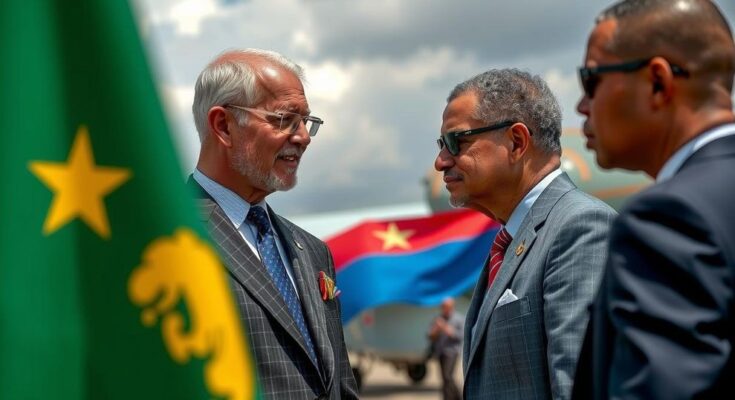US President Joe Biden declared a firm commitment to Africa during his first visit to Angola. He announced a $3 billion investment in the Lobito Corridor railway redevelopment project, aimed at facilitating the export of key raw materials for clean energy technologies. The visit also included discussions on enhancing public-private partnerships and recognition of shared historical experiences related to slavery.
During his landmark visit to Angola, President Joe Biden emphasized a solid commitment towards Africa, stating, “The United States is all in on Africa.” This visit marks the first time a sitting US president has traveled to Angola. Biden engaged with Angolan President João Lourenço, who acknowledged the visit as a pivotal moment in the bilateral relationship between the two nations.
Highlighting a robust $3 billion investment plan, Biden unveiled the Lobito Corridor railway redevelopment project, designed to improve the transportation of critical raw materials necessary for battery production and clean energy advancements. The corridor will connect Angola, Zambia, and the Democratic Republic of Congo. The President is scheduled to visit the Lobito site, which serves as a vital outlet to the Atlantic Ocean.
Competing interests are evident as China has imposed a ban on the export of essential materials like gallium and germanium to the United States, in a reaction to recent US export controls targeting Chinese technology firms. The Lobito Corridor project has garnered the backing of the European Union, the G7 nations, and various private and African financial institutions. National Security spokesperson John Kirby conveyed optimism about ongoing progress, despite the project requiring years to complete.
Additionally, President Biden will visit the National Slavery Museum in Angola, which is located in the historic Capela da Casa Grande. He intends to address the shared legacy of slavery between the United States and Angola during this visit. On a related note, he recently met with Wanda Tucker, a descendant of William Tucker, recognized as the first enslaved child born in North America.
The trip also includes dialogues with African business leaders aimed at enhancing public-private partnerships in energy production, a priority expressed by President Lourenço.
This significant diplomatic engagement underscores the United States’ renewed focus on Africa, especially in areas of trade, infrastructure, and historical recognition, fostering a closer and more cooperative partnership.
This article discusses President Joe Biden’s historic visit to Angola, marking a significant moment in US-Angola relations. The visit is part of a broader strategy by the United States to strengthen partnerships with African nations amidst rising competition from China. The focus on the Lobito Corridor project illustrates the strategic importance of infrastructure in Africa for global trade and clean energy initiatives. Furthermore, addressing historical contexts such as slavery highlights efforts to acknowledge and rectify past injustices.
In conclusion, President Biden’s visit to Angola signifies a renewed commitment by the United States to engage with Africa through significant investments and open dialogues. The emphasis on infrastructure development, specifically the Lobito Corridor, illustrates a strategic approach to bolster trade and energy partnerships. This visit not only enhances US-Angola relations but also acknowledges the historical ties that bind the two nations, paving the way for deeper collaboration in various sectors.
Original Source: indianexpress.com




